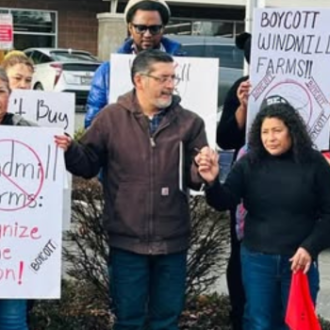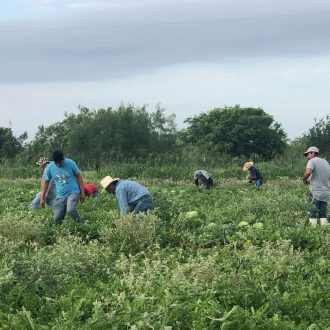
 Farm workers are some of the hardest working people in our country. They play a vital and indispensable role in our entire food system, and all of us depend upon their work to provide us with our food and nutrition.
Farm workers are some of the hardest working people in our country. They play a vital and indispensable role in our entire food system, and all of us depend upon their work to provide us with our food and nutrition.
Exposure to pesticides is one of the daily realities in the lives of the 2+ million farm workers that toil in our fields, orchards, forests and greenhouses in the U.S. today. If we eat the food that they harvest, we must ensure that they are protected against the short and long term impacts of pesticide exposure. It is not only workers who are put at risk when agricultural chemicals are used in the workplace, but their children and families are in danger, also, from take home exposures and from drift from application sites into homes and housing.
Raise Your Voice: Urge the EPA to enforce stronger regulations protecting farm workers from pesticides.
The EPA is considering enforcing stronger regulations to protect farm workers from pesticides and are receiving comments from the public until August 18th.
Send your comment now!
Copy the Farmworker Association of Florida’s (FWAF) sample comment (below). Click here and paste it in the comment box. Follow the instructions to submit your comment. If you have any questions contact FWAF.
Thank you for taking action to ensure that the health and well being of farm worker communities are a priority in our agricultural system!
Scroll all the way down for other ways to take action!
*************************************************************
SAMPLE COMMENT TO EPA: (PLEASE PERSONALIZE!)
Administrator Gina McCarthy
Environmental Protection Agency
1200 Pennsylvania Avenue, N.W.
Washington, DC 20460
Re: Agricultural Worker Protection Standard Revisions; Proposed Rule Docket ID # EPA-HQ-OPP-2011-0184
Dear Administrator McCarthy,
Farmworkers are some of the hardest working people in our country. Exposure to pesticides is one of the daily realities in the lives of the 2+ million farmworkers that toil in our fields in the U.S. today. I am glad that the EPA has moved forward in proposing stronger regulations to protect farmworkers, and I am glad for the opportunity to submit the following comments on these proposals.
- Farmworkers must receive a health and safety training every year, as opposed to the current regulation that requires a training only every five years. The importance of protection against pesticide exposure is diluted if workers think that the risk is not significant enough for them to receive information on a yearly basis. Farmworkers cannot be expected to take proper precautions for their health and safety, if they are not given the information they need and unless they have a clear understanding of the significance of the information to the health of themselves and their families. Farmworkers that do receive an adequate training are very interested in learning about what they are exposed to in the workplace and how they can protect themselves, and they are very grateful to have the information. A half hour training is much less costly than the time and money that is spent in treating and caring for farmworkers and family members that suffer from acute symptoms and/or long-term chronic health problems from pesticide exposure. Increasing evidence from scientific studies over the past 7-8 years have linked exposure to pesticides to a variety of serious and debilitating chronic diseases, including Parkinson’s disease and even ADHD in children. Farmworkers deserve better than that for their years of work providing us with our food and foliage plants.
- The training that farmworkers receive should include information about the dangers of residues on their clothes, their tools and on their bodies, so that farmworkers can avoid the dangers of take-home exposures that can affect their children and other family members. Children, especially babies that crawl on floors and carpets, are especially vulnerable to exposure. Their bodies and brains are still developing. Pregnant mothers risk the health of their babies from pesticide exposure that can be exacerbated by residues that she may bring into her home. Our current understanding of the critical windows of development indicate that pesticide exposure of a pregnant mother can affect the healthy development of the fetus. Warnings and precautions should be included in the information in the worker trainings.
- Training should be required prior to a farmworker beginning work. A ‘grace period’ should not be permitted. An uninformed farmworker, unprepared with proper information, is not equipped with the information he/she needs to take precautions to avoid exposure. This can translate to exposures to the worker, family members and the fetus of a pregnant woman.
- A wallet-sized card that farmworkers can easily carry with them to different job sites with different employers, coupled with required documentation by the employer to demonstrate the date of the training and the name of the person trained, is the best method for record-keeping. I agree with EPA that these records should be kept for a minimum of two-years.
- The current requirement for central posting should not be changed. Many farmworkers in FL work in greenhouses, nurseries, and ferneries, where a central posting location is common and is viewed by the workers. The foliage plant industry in FL is very large, so this has impacts and consequences on tens of thousands of farmworkers in the state.
- Medical monitoring for farmworkers is an important protective measure for pesticide handlers. EPA should adopt a medical monitoring method similar to the one currently being used in California.
- Children under 18 years of age should not be handling pesticides. The currently proposed age of 16 should be increased to 18 years old for pesticide handlers. Accidental spills, splashes, and improper mixing and handling are more likely with young people with less maturity and less experience and dexterity. Farmworker children should not receive less protection than young people working in other industries. The opportunity for mistakes is too possible, especially with younger people. No one under 18 years of age should be permitted to handle pesticides that can cause symptoms that youth may not be able to identify as related to an exposure.
Thank you very much for the opportunity to submit these comments on behalf of the men, women and children who plant, pick, cut, harvest and pack the food that we all eat every day.
Sincerely,
Your name
*************************************************************
Other ways to take action:
- Sign this petition put together by the Pesticide Action Network of North America
- Sign this petition put together by Toxic Free North Carolina
- If you are a health care provider, sign this letter put together by the Migrant Clinicians Network
- If you are a chef, sign this letter put together by Chefs Collaborative
- If you are a faith leader, contact FWAF to learn more about a letter that you can sign.




Comments